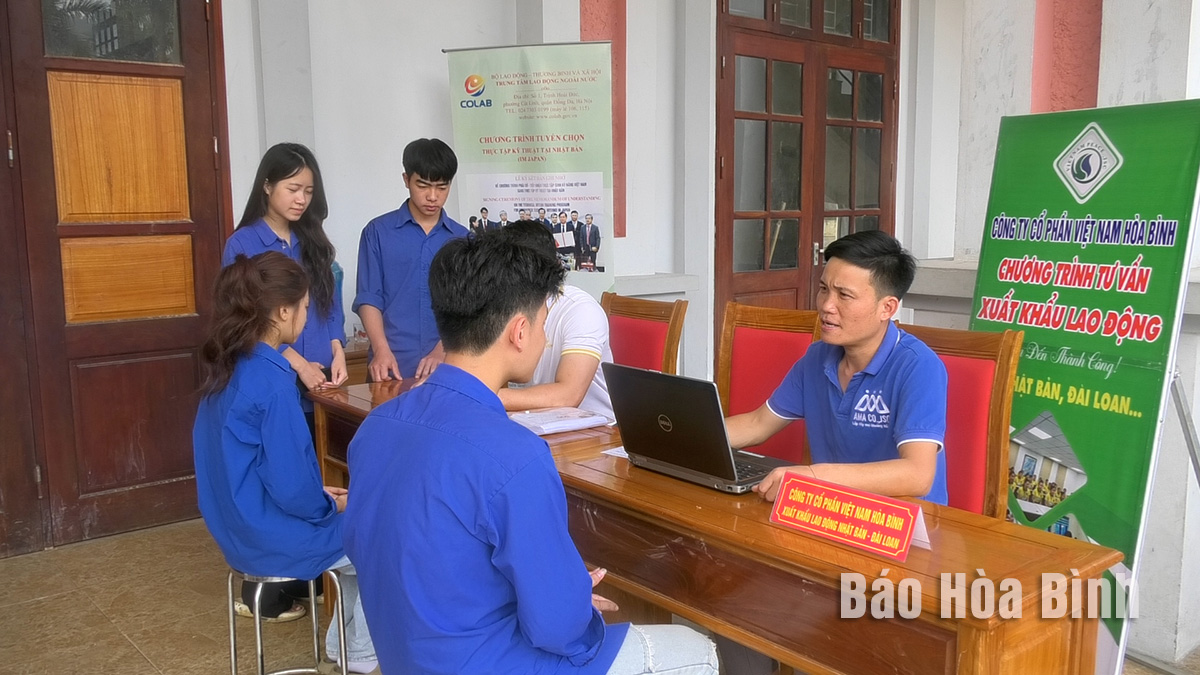
Da Bac district, like many other localities, faces challenges such as unemployment and unstable job opportunities, with an average 900 labourers needing vocational training annually and nearly 1,000 looking for jobs. The district has collaborated with the provincial Department of Labor, Invalids, and Social Affairs, job service centres, and domestic and international recruitment agencies to organise job fairs and consultation sessions every year.

Local youngsters inquire into overseas employment and educational opportunities in China’s Taiwan and Japan at a job fair.
In 2024, the district hosted three job fairs in Tan Minh, Vay
Nua and Doan Ket communes, as well as several career counseling workshops.
Through these efforts, 1,125 local labourers found jobs, mostly in industry-construction,
trade-service, and agri-forestry.
Additionally, 90 workers secured contracts for overseas
employment, with destinations including China's Taiwan and Japan.
Vu Hai Yen, recruitment director at TRAENCO International,
highlighted the high interest in overseas employment among local residents, but
they lack a clear understanding of such opportunities. By providing detailed
information at job fairs, the company has supported workers in accessing
financing and state support to get overseas employment.
Labour export has proven to be an effective tool for job
creation in the locality, offering labourers stable income and fostering
economic growth. Authorities have emphasised the importance of selecting
reputable companies to ensure workers receive proper benefits and avoid risks.
In the coming time, the district plans to strengthen its labour
export initiatives by updating information on recruitment opportunities, and
enhancing vocational training programmes.
A pilot project to recruit labourers for seasonal work in the Republic of Korea
is being carried out in several communes.
The district aims to expand this programme, helping more
residents access international job markets, improve livelihoods, and achieve
sustainable poverty alleviation.
More than just an information technology teacher, Bui Van Nien is an inspiring figure who has nurtured the scientific curiosity and creative spirit of students in Vietnam’s ethnic minority communities.
Da Bac is the most disadvantaged mountainous district in Hoa Binh province, with ethnic minorities accounting for about 90% of its population. Over the past years, the district has mobilised resources to implement ethnic policies to improve the quality of life of local people.
In recent years, Hoa Binh province has consistently prioritised the protection, care, and education of children, particularly those from ethnic minorities and disadvantaged backgrounds, by creating a safe, healthy, and nurturing environment for their all-round development.
The Steering Committee for Tobacco Harm Prevention and Control of Hoa Binh province, in coordination with the Tobacco Harm Prevention and Control Fund, held a ceremony on May 28 in response to the World No Tobacco Day (May 31) and the National No Tobacco Week (from May 25 to 31). The event was chaired by Nguyen Van Toan, Standing Vice Chairman of the provincial People’s Committee and head of the Steering Committee.
Since 2021, the Center for Industrial Promotion and Industrial Development Consulting (CIIDC) under the Department of Industry and Trade has been implementing a school lighting model as part of the plan for using energy efficiently and economically in Hoa Binh Province in the pẻiod of 2021 - 2025. This model not only aims to improve the learning conditions and enhance the education quality, but it also promotes the message of energy saving, energy security, environmental protection and contributes to the goals of socio-economic development.
In the 2024 - 2025 school year, the entire Hoa Binh provincial education sector includes 520 educational institutions and schools. Among them are 13 ethnic boarding schools with 153 classes and 4,487 students. Four of these schools have met national standards, reaching 30.7 percent.



